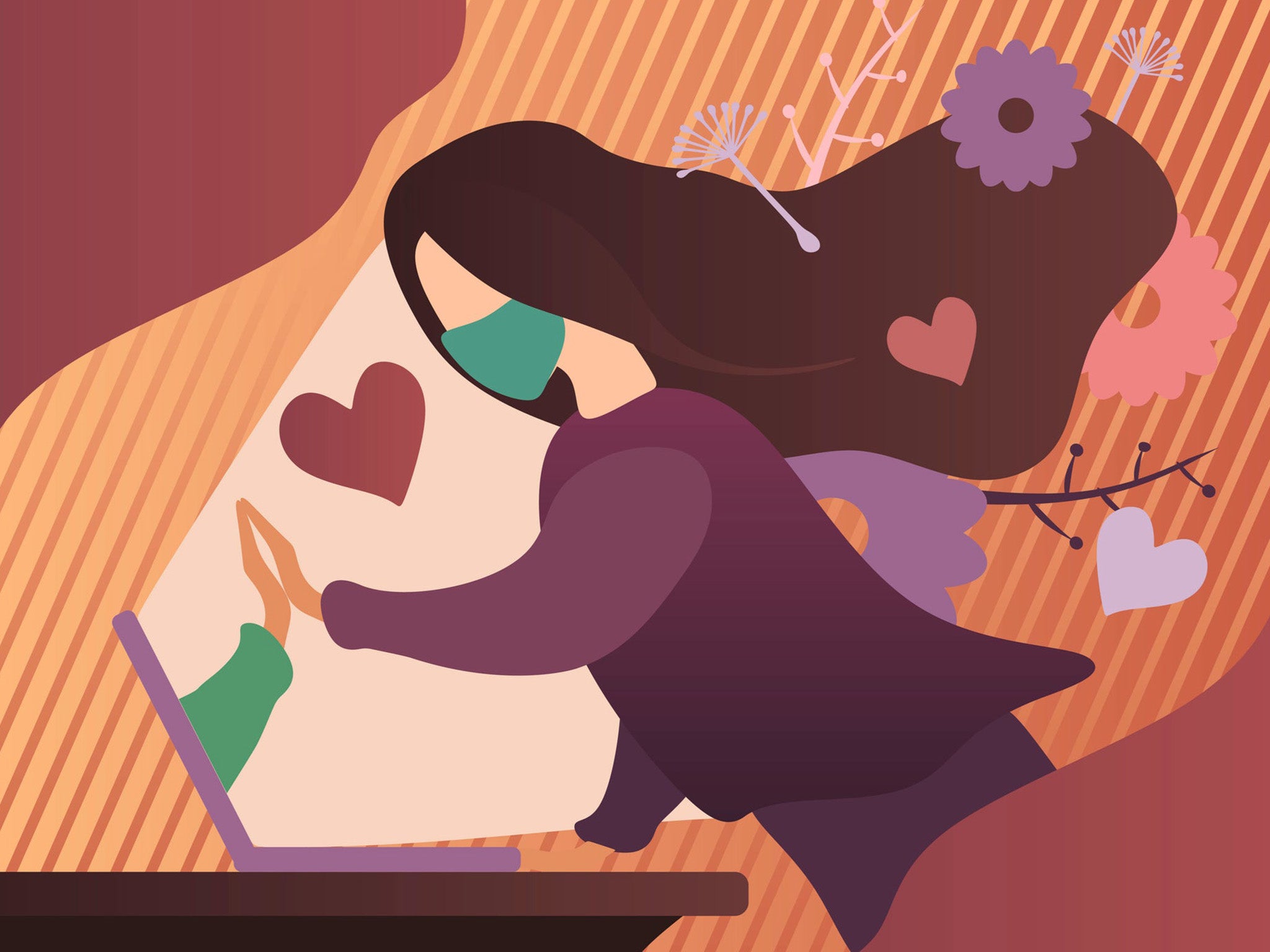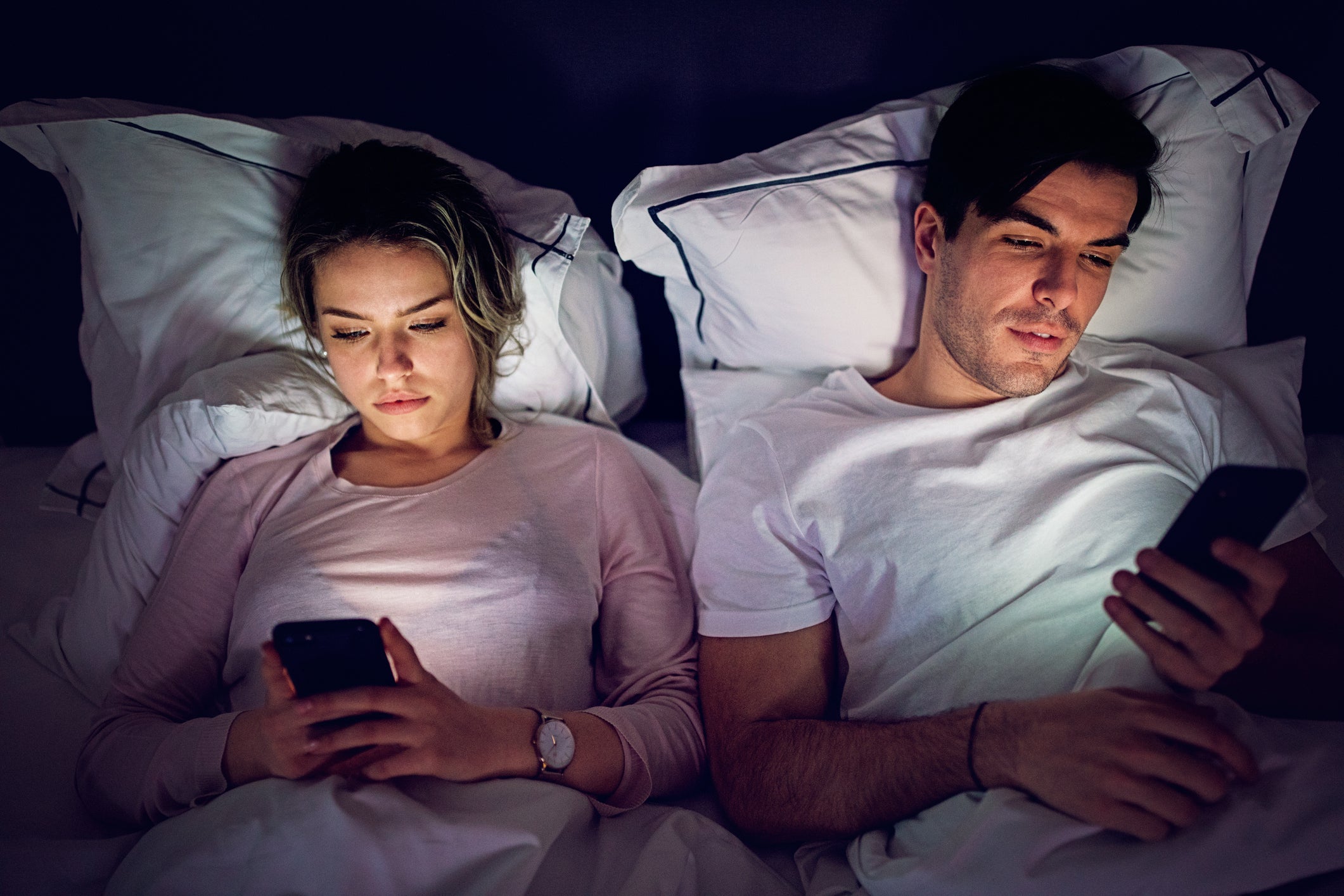A year without sex: How losing intimacy has changed lives
From stress and illness to social distancing rules, the last year has been a tricky time for our sex lives. Natasha Preskey explores how Covid-19 has affected our relationship with intimacy


Your support helps us to tell the story
From reproductive rights to climate change to Big Tech, The Independent is on the ground when the story is developing. Whether it's investigating the financials of Elon Musk's pro-Trump PAC or producing our latest documentary, 'The A Word', which shines a light on the American women fighting for reproductive rights, we know how important it is to parse out the facts from the messaging.
At such a critical moment in US history, we need reporters on the ground. Your donation allows us to keep sending journalists to speak to both sides of the story.
The Independent is trusted by Americans across the entire political spectrum. And unlike many other quality news outlets, we choose not to lock Americans out of our reporting and analysis with paywalls. We believe quality journalism should be available to everyone, paid for by those who can afford it.
Your support makes all the difference.In the days before the first national lockdown was announced, Grace had been bracing herself to redownload Hinge. The 23-year-old split from her boyfriend just two weeks before the government's initial stay-at-home order came into force in late March, and was allowing herself a short “grieving period” before going back to dating. “I was like, ‘I’ll start dating in a few weeks’,” the Londoner tells me over the phone from her parents’ house, where she lives with her teenage brother and sister. “Then we were shut inside our houses, so that didn’t happen.”
In the 10 months since the first round of restrictions was introduced, Grace has been on one socially-distanced date. As the university student lives with her clinically vulnerable mother, going out to meet a stranger even once left her feeling worried about the risk she might pose to her family. “After that, I thought ‘No, it actually doesn't seem worth it’,” she says. “I'd rather just wait till this is over.”
Grace hasn’t had sex in approaching a year now, during which time her ability to deal with a lack of intimacy has fluctuated, with the first few months being some of the hardest. “I was texting loads of people and having phone sex,” she says. “After that, I just completely lost interest for a while.”
Social distancing guidelines have meant that many single people have been unable to have sexual contact with anyone since the first lockdown began on 23 March. Sex between people who aren’t either living together or in a support bubble became illegal in June when the government enshrined its guidelines against meeting others indoors in law. In the knowledge that some people would be doing it anyway, The Terrence Higgins Trust issued some eyebrow-raising advice on how to have sex with reduced Covid risk, including the suggestion of wearing face masks during intercourse.
In September, the government added an exemption to this no sex rule for couples in “established relationships'', though ministers did not offer clarification on what this meant. Even after an uncomfortable interview with Sky News’s Kay Burley on the subject, a coy Matt Hancock would not elaborate on the specifics of the rules beyond the fact that, “there have to be boundaries”.
Now that the country is back in national lockdown, after months of postcode-based tiers, meeting with anyone that you don’t live with indoors (with the exception of support bubbles) is banned, meaning that those who have been abstaining from dating are likely to have to extend their drought by a couple more months at the very least. But what about dating without the sexual contact?
“There's a temptation: ‘If I find someone attractive, will I be able to stay socially distant?’"
Like Grace, many of psychotherapist Hilda Burke’s clients have been feeling nervous about going on dates - even of the socially-distanced variety - during the pandemic. “There's a temptation: ‘If I find someone attractive, will I be able to stay socially distant?’,” says Burke. “People who I speak to are being quite honest with themselves about that, and may be erring on the side of caution about meeting up physically.”
Josh* is living apart from the man he had begun seeing before the pandemic. As well as wanting to follow the rules, the 28-year-old, who is living with his mother and two younger siblings, feels a responsibility to protect his mum, a nurse, and his younger brother, who has asthma, from unnecessary risk. When his sex life was placed on pause, Josh says he initially “crashed”. “I was drinking a lot more, I would find myself going through bottles of wine,” says Josh, speaking over the phone from his mum’s house in north London. “I just didn’t know how to channel my energies.”
Josh and Grace’s frustration isn’t just about scratching a sexual itch. Throughout the pandemic, scientists have warned that a lack of skin-to-skin contact with other people can cause what is known as affection deprivation, or ‘skin hunger’, a neurological issue which can affect us both psychologically and physically. Human touch triggers a release of oxytocin, a chemical messenger which plays a role in bonding with others. It also alters the release of serotonin (a neurotransmitter which affects mood) and impacts our stress system, lowering our heart rate and reducing stress hormone cortisol. Human touch is essential to our wellbeing.
“I just didn’t know how to channel my energies”
And yet, while, for many, a lack of close contact with loved-ones has been a source of stress and low mood in lockdown, for others, sex has been the furthest thing from their minds. Aside from the obvious prohibiting factors that come with social distancing, feelings of anxiety, stress and depression have killed many people’s libido, according to Relate relationship counsellor Peter Saddington.
“People are much more anxious, and struggling harder in the third lockdown than they did in the first,” Saddington says. “And, obviously, irrespective of Covid, depression does have an impact on people's sexual libido.” Even for those with a live-in partner, lockdown isn’t necessarily an easy time to be intimate, especially for those who have children at home who’d usually be in school, he adds. For many, physical intimacy has taken a back seat to simply “focusing more on day-to-day life survival”.

Burke has observed a “polarising” effect on her clients who are in relationships, with many couples either having sex a lot more due to their commuting time being freed up, or having less interest in intimacy due to “not being stimulated in other areas of their lives”.
“There isn't that coming together at the end of the day, or there isn't that absence creating a fondness,” she says. “For some couples, their sex life is healthiest on holiday, when they're in a different location and they're away from a domestic humdrum.”
Yoga teacher Joanna Ferret, who is polyamorous, lives with one partner and has two other boyfriends who she has been unable to see since February last year. She contracted Covid in March, and was unable to get out of bed for almost three months afterwards due to exhaustion caused by long Covid.
The stress of being ill and trying to restructure her business to work online meant that, for Ferret, sex and dating “completely took a back seat”. “I'm really lucky to have such an understanding partner with me at home, because my sex drive has just completely disappeared,” she says. “I think it’s because there is so much uncertainty, and so little hope of actually being able to meet anyone.”
Ferret came out as queer three years ago and had “finally got the courage” to begin dating women for the first time as the pandemic first started to appear on the news in early 2020. “I was very active, teaching around 27 classes a week and meeting up with my partners and actively dating,” says the 37-year-old, who lives in Sheffield. “I had a healthy and happy social life and sex life. Then everything did a 180.”
Ferret’s experience of losing interest in sex is far from uncommon, and contradicts some experts’ initial suggestions that the pandemic could cause couples who are stuck at home to have more sex, leading to a baby boom. Instead, experts are now expecting a huge decrease in births in 2021, due to the “economic shock” of the pandemic. In its annual economic predictions report earlier this month, PwC said we should expect the annual birth rate to dip to its lowest level since records began.
My sex drive has just completely disappeared
For many people, a cocktail of job insecurity, an almost-total shutdown of the dating world and general uncertainty have not just prevented them from having sex, but also from working towards hoped-for life milestones.
This is the case for Kelly*, who has been celibate since the pandemic began but would like to meet someone to start a family with. She turned 30 in lockdown, and feels she’s lost “an important year” to make inroads towards settling down. “Starting a family is something I want to do but, being a gay woman, that’s not going to happen naturally. So the logistics of that and of finding someone who also wants that, that’s a bit of a scary prospect.”
After his initial drop in mood, Josh actually found that a period of not being permitted to be intimate allowed him to develop a “strong bond” of friendship with the man he was seeing when lockdown first came into force. “I feel like I know him like the back of my hand and this is because we’ve done nothing but talk during the lockdown,” he says. “They’ve seen me at my worst, and I've been able to support them at their worst.”
The 28-year-old is aware that some of his friends have been disregarding restrictions to have sex but he is choosing to treat this period of celibacy as a challenge. “People are out there breaking the rules and doing it but I don’t want to because I feel like, for me, it's a test,” he explains. “In the first lockdown, I was all over the place. But then, by the second lockdown, I felt like I was ready.”
“For me, it's a test”
The key thing about being celibate is how the person feels about their situation, says Saddington. “Celibacy in itself is not a bad thing, if you're okay with it and it's something that you're comfortable with,” he advises. “It's about not feeling guilty or not feeling like you've got to be sexual because that's what's expected of you.”
It’s unclear when measures restricting us from meeting new people might be lifted but it seems likely it will be at least several months, rather than weeks. Boris Johnson has said that he will share the government’s plan for leaving lockdown during the week beginning 22 February, and he hopes that schools will reopen on 8 March. However, this easing of restrictions is unlikely to spell an end to social distancing rules.
Grace has noticed a change of tone on the dating apps as it’s become clearer and clearer that Covid will be with us for some time. “It's like everyone almost can't be bothered anymore, because we're not seeing an end to it,” she says. “Obviously, there are people that are breaking lockdown rules and meeting up anyway, but I'm not up for that.”
*Name has been changed



Join our commenting forum
Join thought-provoking conversations, follow other Independent readers and see their replies
Comments